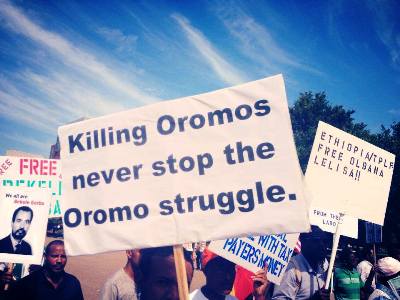140 killed in Ethiopia’s Oromo protests, says rights body
By Tesfa-Alem Tekle
January 9, 2016 (ADDIS ABABA) – At least 140 ethnic Oromo protesters have been killed and many others wounded by Ethiopian security forces during two months of anti-government demonstrations across Oromia region, Human Rights Watch said Friday.

According to the United States-based human rights body, the latest unrest “may be the biggest crisis to hit Ethiopia since the 2005 election violence.” when security forces killed nearly 200 protesters following post-election violence in Addis Ababa.
HRW’s new death toll report is nearly twice that of the estimate it revealed last month.
The Ethiopian government has acknowledged the deaths of only five protesters and denies using excessive lethal force.
The Oromo protesters, however, argue that expansion plan will lead to land grabbing and large scale evictions to tens of thousands of people from their ancestral lands.
Presently, an estimated two million people, mostly farmers live in the Oromia region areas that have proposed by the government for expansion.
The Ethiopian government accuses the protesters of having direct connection with forces that have taken missions from foreign terrorist groups and had previously announced that the country’s Anti-Terrorism Task Force would lead the response.
Human Rights Watch urged Ethiopian authorities to release arrested Oromo politicians.
On 23 December, authorities arrested Bekele Gerba, deputy chairman of the Oromo Federalist Congress (OFC), Oromia’s largest legally registered political party, but with no seats in parliament.
This was not the first time the 54-year-old professor was being arrested. He had also been arrested in 2011 and tried under Ethiopia’s controversial counter-terrorism law which human right groups say is often used as a tool to silence dissent.
In the latest report, Human Rights Watch spokesman Felix Horne said Ethiopian forces were treating demonstrators and opposition politicians “with an iron fist,” closing off ways the protesters can express their grievances nonviolently.
He called the development “a dangerous trajectory that could put Ethiopia’s long-term stability at risk”
Horne says the situation and government’s response was “a dangerous trajectory that could put Ethiopia’s long-term stability at risk”
The Oromos, who inhabit at Oromia region surrounding Addis Ababa are Ethiopia’s largest ethnic group, comprising of about 40 percent of the country’s 94 million people.
(ST)
